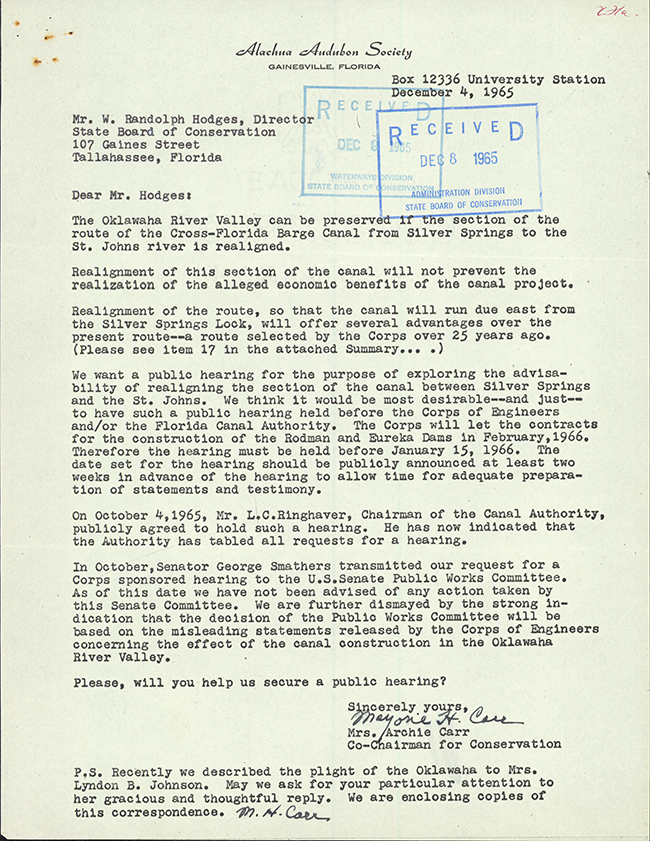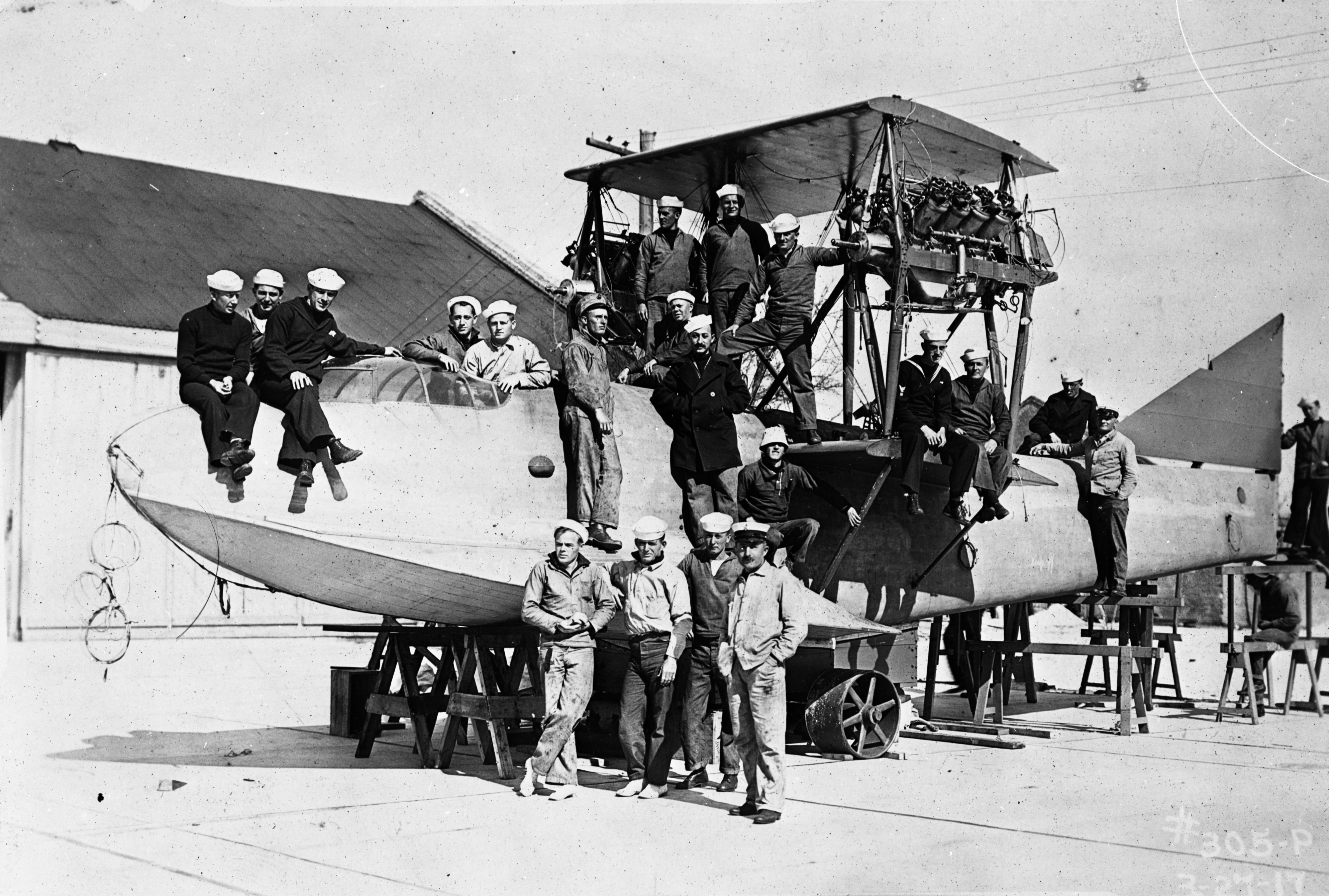The History of Water in Florida
Letter from Marjorie Harris Carr to Randolph Hodges, Director of the State Board of Conservation (1965)
From: Florida Department of Natural Resources, Assistant Director Jervey Kelly administrative files, 1962-1974 (Series 1237, Box 4)
This letter, dated December 4, 1965, is from Marjorie Harris Carr, co-chairman of the Alachua Audubon Society, to Randolph Hodges, director of the State Board of Conservation. Carr was a dedicated environmental activist opposed to the construction of the Cross Florida Barge Canal. In the 1960s, she and her fellow members of the Alachua Audubon Society urged the canal's sponsors to consider moving the canal route to save the Oklawaha River Valley from damage. In the following letter and its attachments, Carr and her allies and associates outline their objections to the canal's Oklawaha route and call for a public hearing to discuss the matter.
The first attachment is a statement from the Alachua Audubon Society regarding the Cross Florida Barge Canal. The second attachment is a response from First Lady Mrs. Lyndon B. Johnson to the Alachua Audubon Society regarding the Cross Florida Barge Canal.

Box 12336 University Station
December 4, 1965
Mr. W. Randolph Hodges, Director
State Board of Conservation
107 Gaines Street
Tallahassee, Florida
Dear Mr. Hodges:
The Oklawaha River Valley can be preserved if the section of the route of the Cross Florida Barge Canal from Silver Springs to the St. Johns river is realigned.
Realignment of this section of the canal will not prevent the realization of the alleged economic benefits of the canal project.
Realignment of the route, so that the canal will run due east from the Silver Springs Lock, will offer several advantages over the present route - a route selected by the Corps over 25 years ago.(Please see item 17 in the attached Summary... .)
We want a public hearing for the purpose of exploring the advisability of realigning the section of the canal between Silver Springs and the St. Johns. We think it would be most desirable -- and just -- to have such a public hearing held before the Corps of Engineers and/or the Florida Canal Authority. The Corps will let the contracts for the construction of the Rodman and Eureka Dams in February, 1966. Therefore the hearing must be held before January 15, 1966. The date set for the hearing should be publicly announced at least two weeks in advance of the hearing to allow time for adequate preparation of statements and testimony.
On October 4, 1965, Mr. L.C. Ringhaver, Chairman of the Canal Authority, publicly agreed to hold such a hearing. He has now indicated that the Authority has tabled all requests for a hearing.
In October, Senator George Smathers transmitted our request for a Corps sponsored hearing to the U.S. Senate Public Works Committee. As of this date we have not been advised of any action taken by this Senate Committee. We are further dismayed by the strong indication that the decision of the Public Works Committee will be based on the misleading statements released by the Corps of Engineers concerning the effect of the canal construction in the Oklawaha River Valley.
Please, will you help us secure a public hearing?
Sincerely yours,
[signed] Marjorie H. Carr
Mrs. Archie Carr
Co-Chairman for Conservation
P.S. Recently we described the plight of the Oklawaha to Mrs. Lyndon B. Johnson. May we ask for your particular attention to her gracious and thoughtful reply. We are enclosing copies of this correspondence. [signed] M.H. Carr
A SUMMARY OF THE PERTINENT FACTORS IN THE CAMPAIGN BY CONSERVATIONISTS TO PRESERVE THE OKLAWAHA RIVER WILDERNESS AREA
1. Twenty years ago the plans for the route of the Cross Florida Barge Canal, through the Oklawaha River Valley, were drawn up ty [sic] the U.S. Army, Corps of Engineers.
2. Twenty years ago no state or federal agency concerned with our natural resources was involved with the planning of the canal project.
3. Twenty years ago the many and varies values inherent in wilderness areas were not clearly defined nor widely recognized.
4. Twenty years ago the Cross Florida Barge Canal project of the Corps of Engineers received approval by the U.S. Congress.
5. After two decades of dormancy the reactivated canal project received an initial appropriation from Congress in 1962.
6. The plans for alignment of the reactivated canal project have never been subject to review by any state or federal agency concerned with our natural resources.
7. The Corps of Engineers and the Florida Canal Authority have released statements, many of them misleading, evaluating the effect of the canal construction on the wildlife and wilderness of the Oklawaha River Wilderness Area. These statements have received wide publicity and distribution.
8. The reactivated canal project has not yet received a public hearing in Florida.
9. Many of the values - tangible and intangible - in our heritage of natural wilderness areas have been defined and recognized at the state and national levels within the past decade.
10. The free-flowing, unspoiled Oklawaha River and its heavily forested valley constitute a most valuable and unique natural asset. The high quality of the river is indicated by the inclusion of the Oklawaha River in the list of 73 American Wild Rivers recommended for preservation by the U.S. Department of Agriculture and the Department of the Interior. The value of the Oklawaha River and the adjacent wilderness lands is attested to in the formal and vehement protests, inspired by the threat of the destruction of the Oklawaha area by the canal construction, released by the leading state and national conservation organizations, in the statements, on record, by many outstanding authorities in the fields of ecology, conservation, land-use, and ethics, and, most significantly, by the protests of thousands of Florida citizens.
11. The many wilderness values of the Oklawaha River Wilderness Area have been either completely overlooked or have received inadequate consideration by the Corps of Engineers in their present plan of constructing the canal through the Oklawaha River Valley.
12. The Corps of Engineers will let the contracts for the Rodman and Eureka Dams, to be constructed in the Oklawaha River Valley, early in 1966.
13. The construction of the canal through the Oklawaha River Valley will (1) obliterate 45 miles of the Ocklawaha River, (2) destroy, by flooding, over 27,000 acres of the biologically important, wet hardwood forest of the Oklawaha Valley, (3) drastically alter the last ten miles of the river and its valley forest by cutting off the flow of water in this stretch of the river for fifty per cent of the time, (4) greatly lower the quality of the adjacent wilderness area - including the Ocala National Forest - by encouraging industrial development, with the grave threat of concomitant air and water pollution, in the very heart of the Oklawaha River Wilderness Area, and (5) ultimately bring about expensive and difficult problems of mosquito control and water-resource management by the creation of a vast, stagnant, shallow, snag-studded reservoir in the Oklawaha Valley.
14. The destruction of the Oklawaha River Valley and the damage to the adjacent wilderness area can be easily avoided if the section of the canal route from Silver Springs to the St. Johns is realigned.
15. Conservation organizations have not opposed the Cross Florida Barge Canal project. THEY HAVE OPPOSED THE WASTE AND DESTRUCTION OF OUR NATURAL HERITAGE TO BE BROUGHT ABOUT BY THE CONSTRUCTION OF THE CANAL IN THE OKLAWAHA VALLEY.
16. We suggest realignment of the canal route from Silver Springs to the St. Johns so that the canal will run due east from the proposed Silver Springs Lock, parallel State Road 40 through the Ocala National Forest, and enter the St. Johns River at the southern end of Lake George.
17. This realigned route to the St. Johns is about ten miles shorter than the present route. Other obvious advantages of the realigned route are (1) reduction of rights-of-way costs and difficulties, (2) reduction of futrue zoning problems in an area emphasizing out-of-door activities, (3) public access to the canal for whatever recreational activities are to be available in the canal, and (4) elimination of the future costly and difficult problems of reservoir management.
19. REALIGNMENT OF THIS SECTION OF THE CANAL WOULD NOT PRECLUDE THE REALIZATION OF THE ALLEGED BENEFITS OF THE CANAL PROJECT.
20. We have asked the Corps of Engineers and/or the Florida Canal Authority TO HOLD A PUBLIC HEARING, PRIOR TO DECEMBER 1, 1965, IN OCALA OR GAINESVILLE, FLORIDA, FOR THE PURPOSE OF HEARING STATEMENTS REGARDING THE ADVISABILITY OF REALIGNING THAT PART OF THE CROSS FLORIDA BARGE CANAL BETWEEN SILVER SPRINGS AND THE ST. JOHNS. RIVER.
21. It seems clear that prompt and decisive action by the concerned citizens of Florida and their elected representatives, coupled with the active cooperation of local, state and federal agencies, can result in the preservation of the Oklawaha River Wilderness Area.
The Alachua Audubon Society
Gainesville, Florida
November 10, 1965
November 3, 1965
Dear Dr. Ohanian, Mrs. Carr, and Dr. Anthony:
Thank you for your recent letter and your dedicated interest in preserving the natural beauty of America.
Our Nation has been blessed with a rich scenic heritage, and as our civilization grows it is up to all of us to have the wisdom to preserve nature's corners of beauty and channerl our growth in ways that enhance - and do not diminish - our natural surroundings.
Your descriptions and photographs of the Oklawaha and Suwanee Rivers convey a glimpse of their wild, peaceful beauty, and I share with you a hope that fair consideration is given to their natural values before any irrevocable decisions to develop them are made.
I am sure that the President intended to provide public alternatives to full river impoundment and development when he proposed his wild rivers legislation to Congress, and your support of this principle is deeply appreciated.
My time now is being devoted to the President's health and recovery, and so I will not have an opportunity to visit your lovely area in the forseeable future, however, I wish you well in your efforts to secure appropriate consideration of its natural beauties.
Sincerely,
[signed] Lady Bird Johnson
Mrs. Lyndon B. Johnson
The Alachua Audubon Society
c/o Dr. Jack Ohanian, President
Box 12336 University Station
Gainesville, Florida

 Listen: The Assorted Selections Program
Listen: The Assorted Selections Program